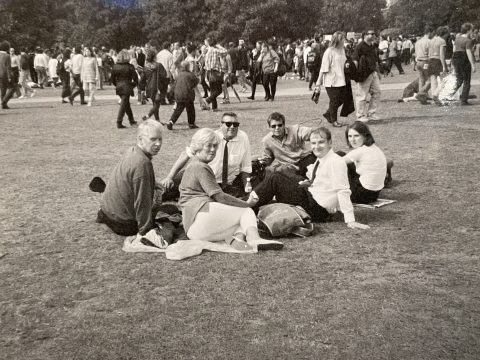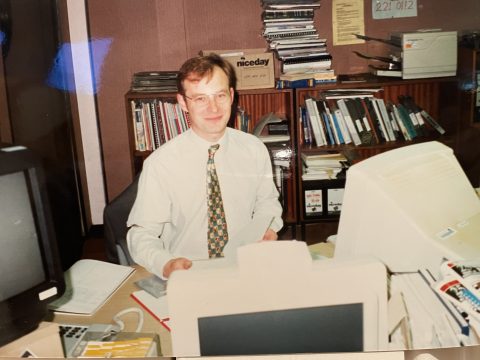It’s been a heartbreaking week for the Royal Family, and a brutal one for the BBC. I never thought I’d have to do some hard thinking about whether my slogan “30+ YEARS AT THE BBC” is such a pull after all.
But in this article — longer than most that I write — I share my experience of a career at the BBC, and offer three thoughts that I hope will be helpful for any business leader who may feel the heat of a scandal exploding beneath them.
We all remember where we were when we heard that the Princess of Wales died, and I suspect many of us, too, remember where we were when That Interview with her aired less than two years earlier.
I had just come off a very full day in the BBC North East newsroom, reporting (during the day) the new phenomenon of School League Tables on BBC Radio Newcastle, Cumbria and Cleveland and then, in the early evening, reporting live for Look North on BBC One. School League Tables Day was the most important date in the calendar for a regional Education Correspondent like me at the time.
Like so many of the twenty million or so people who tuned in, as I sank into a well earned glass of red wine that wet November evening, I was in awe of the celebrity reporter who had somehow secured this scoop.
We now all know he had secured it, in part, by deception.
One result of this deception, finally acknowledged by the BBC more than a quarter of a century later, is that many people may now have lost faith in the broadcaster they fund with their license fee.

Taking a break in Kensington Park with the BBC reporting team at the Princess of Wales’ funeral.
Another result, less widely noted perhaps in the mainstream media this week, is that BBC staff have been left shattered.
So what does this sorry story tell us that might help C suite leaders in business today, as they strive to maintain trust and affection from their staff, as well as their customers and clients?
1 — Spot where the real ‘talent’ lies
Martin Bashir was what is known within the industry as ‘the talent.’
It’s a phrase that’s always revolted me, when applied to the highest paid ‘on air’ names and faces, because it’s seemed to me to be a slap in the face of the equally (if not more) talented teams of producers, editors, engineers and assistants who invariably do far more of the work, shoulder far more of the responsibility and are paid far, far, far less while doing much, much, much more than those that appear in front of the camera.
This scandal is perhaps a reminder to business leaders that your ‘talent’ may be more likely to disappoint you than staff further down your management structure. Pander to ‘the talent’, and watch as the complacency sets in.
I’ve seen this for myself in BBC training and hospitality suites.
Twelve years ago, I spent a year on secondment as part of the BBC Academy, training new journalists at the BBC. Part of my role was to arrange for top presenters to meet them for early evening drinks on the Tuesday of their training week, to share stories and answer questions.
Many of these guests were charming, gracious storytellers, wanting to help and inspire. But I was also struck by several who arrived ill prepared, indifferent and vain, with (it struck me) far fewer insights about journalism and reporting than I could have offered them myself, based on my relatively mainstream career in the BBC English Regions.
Having now left the BBC, I have been able to develop my own career as a Speaker (revealing ‘how news works’), and as an MC, at a wide range of events.
I’ve detected in some fellow speakers the same trend that stems from complacency: the higher paid the speaker, the more likely they may be to arrive gung-ho, to deliver a stump speech oblivious to the audience’s actual interests and the organiser’s brief.
One speaker, in the £10,000 + bracket, asked me (minutes before we went on stage), to remind her what the title of her speech actually was.
If you’re a business leader, use the BBC Bashir moment to ask yourself: “where does the ‘talent’ really lie in my business?” I’d suggest it isn’t always at the top.
2 — Remember that your Staff will be shattered, too
Across the world this week, it’s not just audiences who appear to have been left open mouthed at the revelation that a BBC reporter behaved in such an underhand way, and then covered it all up.
BBC Staff have been left open-mouthed, too.
You will form your own view on whether what I type here is true, but in 31 years in BBC newsrooms I cannot think of a single journalist I worked with who would have behaved in such a way. Quite the reverse.

BBC North East Newsroom, c. 1997. Books, big computers, and a fax machine.
An entire department, known as Editorial Policy, exists to hold hoops high for reporters and producers to jump through in their journalism. Many reports I worked on took months to come to air as a result of this scrutiny. Many are simply shelved because to broadcast them would risk being unfair or inaccurate.
Each Wednesday during the training week I helped run at the BBC Academy was Editorial Policy Day — consisting of workshops delivered by these brilliant and scrupulously fair minds from the Editorial Policy unit. They amounted to an internal editorial police force, feared but respected, wise, patient and challenging.
The Bashir debacle will have shattered morale amongst BBC journalists, because they know that he broke the very rules that they so scrupulously follow. The Editorial Policy unit was in place to uphold them in 1995, and it is there now in 2021.
If you’re a business leader, use the Bashir moment to ask yourself: how do I demonstrate to my staff that there isn’t one set of rules for some staff, and no set of rules whatsoever for others?
3 — If you fail, ‘own it’
Prince Harry, in what struck me as a gracious statement, thanked ‘those who have taken some form of accountability, and owned it.’
It’s not a phrase I’m drawn to, but BBC journalists have this week ‘owned’ the story. Every bulletin has led with the latest twist and turn. Navels have been examined, swords fallen upon, sackcloth torn, ashes scattered. Editorial decisions have been taken at the highest level that anything less would compound the original offence.
No such decision appears to have been taken by Senior Management until today, four days later.
In what must be one of the most disgraceful decisions of the entire scandal, BBC management consistently turned down requests from journalists of all kind to comment as the story developed. Yes, the Director General gave an honest interview as the scandal broke on Thursday, but from Friday until today (Monday) — as the Royal Family’s comments raised the story to an even higher level — the line was “nobody is available for interview.”
This, from a broadcaster who expects governments and organisations to make people available when there are questions to be asked, is dumbfounding.
If you’re a business leader caught in a crisis, use the Bashir moment to remind yourself to tell it like it is. It’s not enough to leave your staff to do it for you.
Prince William ended his statement on Thursday evening with the following words:
“These failings, identified by investigative journalists, not only let my mother down, and my family down; they let the public down too.”
In so doing, he acknowledged the role of journalists, and reminded us why what they do matters. They serve a paying audience.
You’ve read this far because you know how much business matters, too. Businesses serve an audience: your consumers, your clients and your customers.
It’s up to all of us not to let our audiences down.